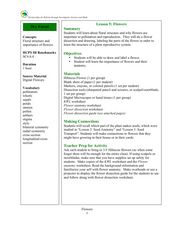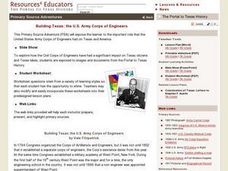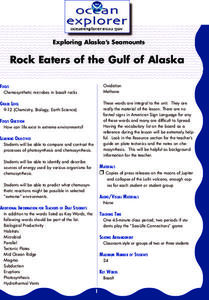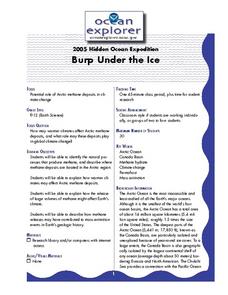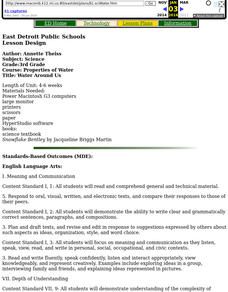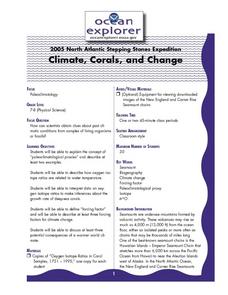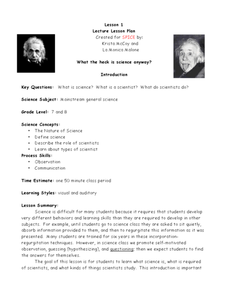Curated OER
How Does Your Magma Grow?
Students identify the three types of plate boundaries and the Earth's tectonic plates system. They examine how the Galapagos Islands were formed and hydrothermal vents.
Curated OER
What's the Difference?
High schoolers discover how volcanic processes differ at convergent and divergent tectonic plate boundaries. They identify three geologic features that are associated with most volcanoes on Earth.
Curated OER
What's The Difference?
Students identify geologic features that are associated with volcanoes. In this volcanic exploration instructional activity students compare and contrast convergent and divergent volcanoes and are able to explain why some erupt more...
Curated OER
Do You Have the Key?
Students practice using a dichotomous key. For this classification lesson, students read an article about scientific exploration and identification of new species. They use a dichotomous key to identify objects and create their own key.
Curated OER
What's in that Cake?
Learners discover the methods scientists use to investigate Oceanic habitats. In this oceanography lesson plan, students utilize the Internet to identify deep sea submersibles and how they help scientists study the Charleston Bump....
Curated OER
Help, I can't reach it!
Students learn the major organ systems in the human body and research simple machines on the Internet; They design an informational brochure about a medical profession and present that career topic to the class.
Alabama Learning Exchange
Tornadoes
Students research tornadoes. For this weather lesson, students construct a KWL chart on tornadoes and view the video National Geographic-Tornadoes. Students discuss the facts they learned from the film and complete the KWL chart.
Curated OER
Dry Forest: Flowers
Students explore botany by examining diagrams. In this plant reproduction instructional activity, students define a list of plant vocabulary terms and identify plant anatomy from a diagram. Students complete several plant activity...
Curated OER
Aspects of Individual Human Blood Pressure
Learners learn about human blood pressure. In this biology lesson plan, students gain an understanding of the relationship between hypertension and it's risk factors, demonstrate how pressure builds up in clogged arteries, and measure...
Curated OER
What's in That Cake?
Learners explore the depths of the Gulf of Mexico. In this deep-sea habitat lesson, students construct edible models of deep-sea habitats as they bake cakes that include representations of the habitats and the organisms that live there....
Curated OER
This Life Stinks
Learners study how organisms that live in cold seep communities get energy from methane. In this organism lesson students write a brief report and identify oxidation reduction reactions and explain if these are dependent of...
Curated OER
Inventing and Presenting Unit 1: Analyzing Nonfiction and Inventing Solutions
Middle schoolers read about and identify patterns in the invention process. Students discuss and write about information learned from research. Middle schoolers compile a list of problems, choose one, write a problem statement, and...
Curated OER
Down To Earth
Fifth graders study the physical properties of minerals in order to identify them. They examine how minerals are used before taking part in a activity in which they market toothpaste made from specific minerals.
Curated OER
Building Texas: the U.S. Army Corps of Engineers Lesson Plan
Seventh graders study the engineering projects that the US Army Corps of Engineers initiated during the development of Texas. They examine primary source documents that are in digital and print form, and identify US Army Corp of Engineer...
Curated OER
Trash...it really piles up!
Young scholars investigate a contemporary "midden" by analyzing trash collected from various sources and determining life-style choices people make. They see that reducing the amount of waste we generate is helpful to the the environment.
Curated OER
And Now for Something Completely Different...
Students identify organisms that are typical a part of a hydrothermal vent. They examine why hydrothermal vents are short-lived.
Curated OER
Getting to the Bottom
Pupils identify taxa in Arctic benthic communities. They discover organisms that live in these Arctic areas. They analyze data compiled for the Canada Basin Benthic Samples, 2002.
Curated OER
Rock Eaters of the Gulf of Alaska
Learners compare and contrast the processes of photosynthesis and chemosynthesis. They identify and describe sources of energy used by various organisms for chemosynthesis.
Curated OER
Burp Under the Ice
Students examine the impact of climate warming on Arctic methane deposits. They identify natural methane processes and describe how this contributes to species extinction. They write reports on their findings.
Curated OER
Volcanoes: Mount Vesuvius
Students explain how volcanoes form. In this earth science lesson plan, students identify the different types of volcanoes. They create brochures about Mt. Vesuvius before and after the eruption.
Curated OER
Water Around Us
Third graders learn the effects of temperature on the states of water. Then students create paper snowflakes. Finally students complete a computer project with software which teaches the different states of water.
Curated OER
Climate, Corals, and Change
Young scholars examine oxygen isotope ratios and how they are related to water temperature. They also identify three forcing factor changes for climate change.
Curated OER
Just Jelly
Students identify common gelatinous zooplankton in the Canada Basin and their ecological role. They compare and contrast feeding strategies of at least three different types of gelatinous zooplankton.
Curated OER
What the Heck Is Science Anyway?
Here is a 12-page outline of an introductory science lesson. The teacher lectures on what science is, the role of a scientists, different disciplines of science, and the impact of scientific discoveries. Detailed lecture notes are...









